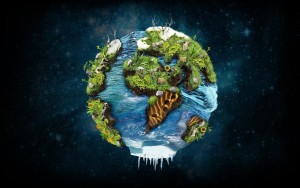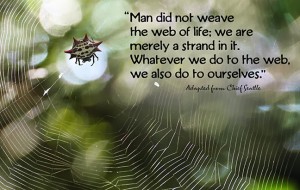Earth Day: The Time Has Come For Change
Apr 22nd, 2016 | By admin | Category: Climate ChangeBy Suzanne York.
Yet another Earth Day is upon us, now officially known as International Mother Earth Day. In honor of it this year, some real steps forward are taking place, with the signing of the Paris climate accord today which, amongst other things, strives for limiting global warming to 1.5 degrees Celsius above preindustrial levels.
True, the overall accord is short on specifics and leaves a bit to be desired (350.org’s Bill McKibben said “This didn’t save the planet, but it may have saved the chance of saving the planet.”).
It is, though, movement in the right direction. And with one scientific report after another coming out on the increasing severity of the impacts of climate change, action is required now.
At What Cost?
Yet it also time to push the envelope and move beyond thinking that is keeping us stuck or moving too slow in the face of serious climate impacts. Do we have to lose island nations and uproot people from their ancestral homes because we can’t act fast enough?
The Vulnerable 20, a negotiating bloc of 43 developing countries with much to lose in a warming world, voiced their concerns this week, just ahead of the signing. Cesar Purisima, chairman of the group from the Philippines, called the international agreement “a modest beginning toward securing a sustainable future for our world.” He went on to say “Settling for less ambitious goals mean some of us – our people and our lands – would be wiped off the face of the Earth by the ravaging effects of global warming.”
Do we have to lose the Great Barrier Reef in order to get that our continued reliance on dirty fossil fuels is warming and acidifying the oceans? Record breaking ocean temperatures have triggered a global coral bleaching event that is devastating the Great Barrier Reef.
Almost 93% of reefs on the Great Barrier Reef have been hit by coral bleaching, according to the results of a comprehensive survey released this week. Of the three mass bleaching events recorded on the reef, and all of them have happened since 1998, and scientists say this bleaching episode is the worst they’ve ever seen.
The Great Barrier Reef is home to some 215 species of birds, 30 types of whales or dolphins, half a dozen kinds of sea turtle, and 10 per cent of the entire world’s species of fish. Ironically, at the same time this coral bleaching is taking place, the Australian government is pushing ahead with Adani Carmichael coal mine, slated to be the biggest coal mine in the Southern Hemisphere. The Australian Conservation Foundation has calculated that if the Carmichael mine operates for 60 years, it would yield 2.3 gigatons of coal, which would generate 4.73 gigatons of carbon dioxide when burned.
A Paradigm Shifting Moment
It is time to heed the words of Father Thomas Berry, often referred to as an environmental theologian, who called for “a mutually-enhancing human-Earth presence.” In “The Dream of the Earth” he wrote the following:
The time has now come, however, when we will listen or we will die. The time has come to lower our voices, to cease imposing our mechanistic patterns on the biological processes of the earth, to resist the impulse to control, to command, to force, to oppress, and to begin quite humbly to follow the guidance of the larger community on which all life depends. Our fulfillment is not in our isolated human grandeur, but in our intimacy with the larger earth community, for this is also the larger dimension of our being. Our human destiny is integral with the destiny of the earth.
That last line is worth repeating – “our human destiny is integral with the destiny of the earth.” This viewpoint, though radical-sounding to some, is what will make a breakthrough on really overcoming the challenges facing our society and environment.
Too many people, it seems, either miss that humankind is part of the web of life, or think that we are above it. The fact that we think we have dominion over or are separate from all of the other species we share the planet with is partly what got us to where we are today. As government officials pat themselves on the back for the Paris climate agreement, to really honor and save Earth will require bigger, bolder and more inclusive actions to benefit all inhabitants.
Suzanne York is Project Director of Transition Earth.


![Great Barrier Reef [Creative Commons U.S. Fish & Wildlife Service, 2011]](http://populationgrowth.org/wp-content/uploads/2016/04/reef-300x190.jpg)
